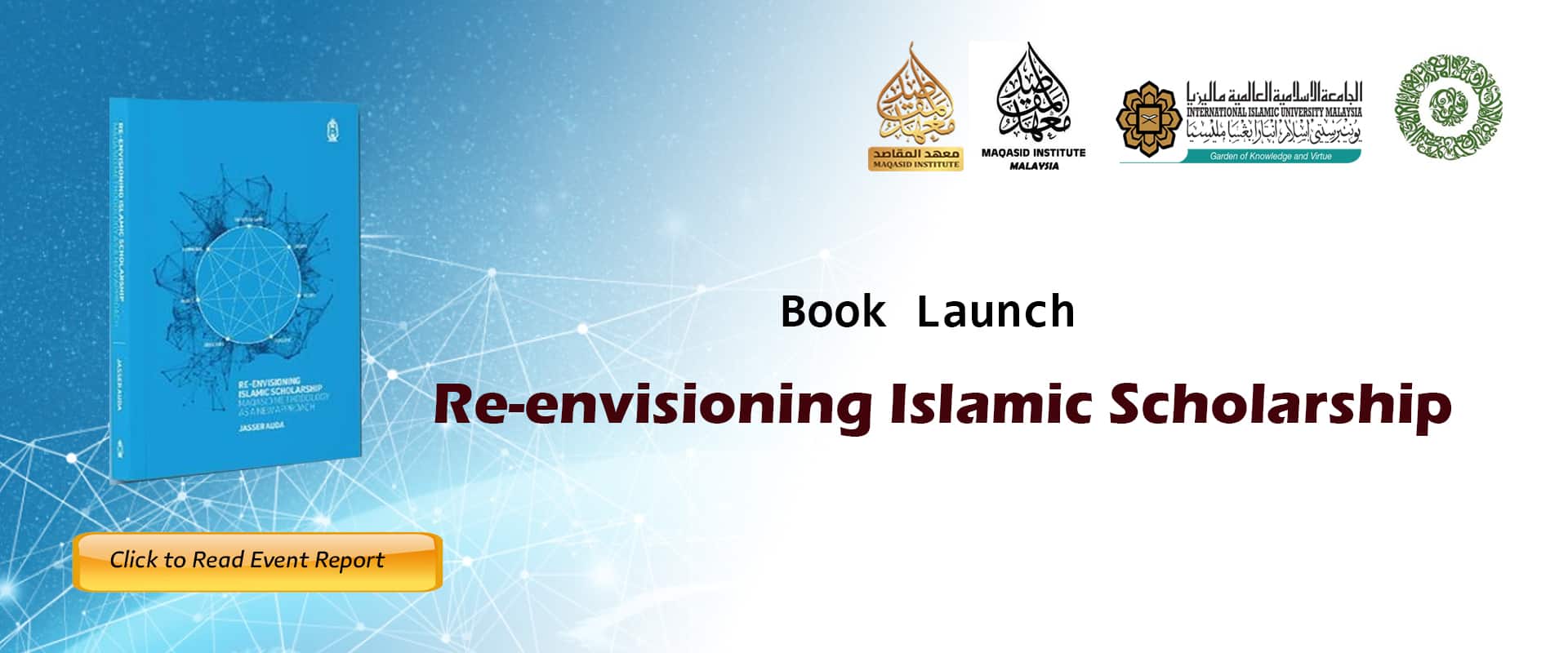Events: Launching “Re-envisioning Islamic Scholarship”
In a highly prestigious online event attended by renowned academics and scholars, the Maqasid Institute marked last October the launching of Prof. Jasser Auda’s latest publication “Re-envisioning Islamic Scholarship: Maqasid Methodology as a New Approach” after a few years of the his hard and dedicated work.
The book is timely and deserves a wide readership masterfully focalising the Quran and Sunnah in order to integrate scholarship across time and disciplinary boundaries. This is done to highlight that human thought and action are closely interconnected in a purposeful universe. Through a five-step methodology, Maqasid Institute’s President proposes that scholars and practitioners in all fields of knowledge seek divine guidance through cycles of reflection on the sources of revelation and discover the interconnectedness of reality.
The event jointly encompassed Maqasid Institute (MI), Maqasid Institute Malaysia (MIM), International Islamic University Malaysia (IIUM) and ISTAC Publications.
In the process, the objectives of revelational guidance would manifest through the process of ‘emergence’, which is premised upon deep understandings of the concepts, objectives, values, commands, universal laws, groups and proofs. Such an approach may alter and shape our understandings of the reality of the universe and human society and help us to re-envision public policies, research agendas, educational institutes, and organisational strategies. This approach is significant in a world that has become accustomed to individualism, inequality, fragmentation, and loss of meaning.
The book launch event featured several renowned Muslim academics and scholars who will share their insights and perspectives on the book and its reform proposals each according to his field of expertise such as Sheikh M. Sharif el-Banna, representing the book publisher, Claritas Books, and also MI Board Member, who found the book meeting a concern that the Ummah has towards renewal and tajdeed.
“There is a need for an authentic, rooted, dynamic and relevant Islamic intellectual framework which seeks to address these contemporary challenges”, he said.
El-Banna set three strands of contemporary knowledge revival which are Islamization, Text-context and Maqasid methodology.
“Maqasid methodology as presented in this book is taking the best positive contributions of these three strands overcoming the pitfalls, weaknesses and deficiencies and going back to the drawing board and trying to build up a framework from the sources itself rather than the historical narrative of how maqasid evolved. This is an authentic, bold and courageous effort to rethink Islam not just Maqasid and reenvision knowledge and reconstruct Islamic scholarship using maqasid not just as an approach but as a methodology”, he added.
“All scholarly inferred concepts must yield to the authority of the concepts that are textually expressed where truthful authority is clearly established”, “While identifying and drawing on other knowledge may be necessary and is indeed a step in the Maqasid methodology, every effort must be exerted to ensure that such knowledge does not betray the fundamental tenets of Islam and the core teachings of Revelation”.
Excerpt from the book
El-Banna mentioned an example of maqasid application to envision sustainable development saying this could be the application of the early maqasid scholarship. However, this new project of maqasid is about questioning sustainability and what development means in the Qur’an then building a framework and constructing a paradigm of how Islam defines both terms. ” We do not accept terms that are reflective of worldviews, alien to us and beyond our resources and then claim it is Islamic”, he explained.
While Dr. Zaid Barzinji, MI Executive Director, described the new maqasid methodology as “a call to humanity” that seeks divine guidance through a holistic and coherent comprehension of Wahy (revelation) to recognize and connect Allah’s Ayat/Signs all around us.
Other speakers alongside the author included Professor Emeritus Tan Sri Dato’ Dzulkifli bin Abdul Razak, an education specialist and thinker, and the current Rector of the International Islamic University Malaysia (IIUM), Professor Dr. Abdul Aziz Berghout, Dean of International Institute of Islamic Thought (ISTAC), IIUM) and Prof. Datuk Dr. Osman Bakar, renowned Muslim philosopher and thinker and moderated by Motaz Al-Thaher, Manager of Maqasid Scholars Fellowship Program at Maqasid Institute and PhD candidate at IIUM considered.


